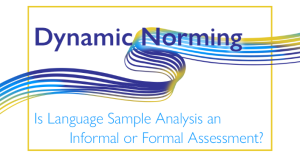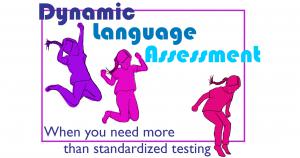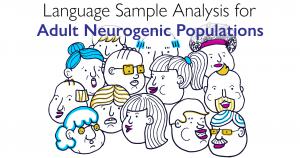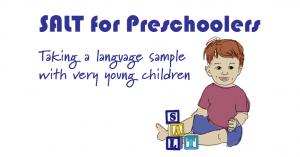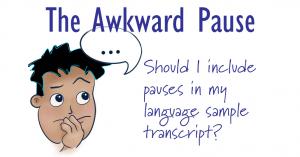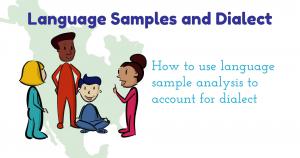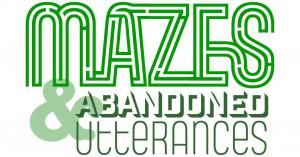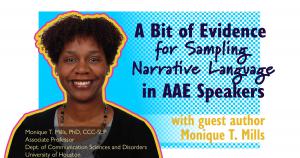-
Letting Them Go: Exiting Students From Speech-Language Services
Jun 01 20220We’re finally at the end of the school year! It’s that time of year when I evaluate and consider who really needs to continue speech-language services. When possible, I try to exit students before middle school. But when IS it time to let them go? Throughout my 20 years as an SLP, I’ve provided services covering the lifespan. One of the best (and probably most rewarding) parts of being a...
-
Is language sample analysis an informal or formal assessment?
Jan 17 2022When including language sample analysis as part of a comprehensive evaluation to report language skills across settings and contexts, I always used to format my diagnostic reports with the following headings: “Observations and Parent/Teacher Report,” “Standardized Testing,” “Informal Assessments,” and of course, “Conclusions.” Usually, I included my data on language sample analysis under the “...
-
Dynamic Language Assessment: When You Need More Than Standardized Tests
Sep 21 2021ASHA has a great article on dynamic assessment which gives a clear definition of dynamic assessment: “Dynamic assessment (DA) is a method of conducting a language assessment which seeks to identify the skills that an individual child possesses as well as their learning potential. The dynamic assessment procedure emphasizes the learning process and accounts for the amount and nature of exa...
-
Language Sample Analysis for Adult Neurogenic Populations
Aug 18 2021Last month we talked about SALT and language sample analysis (LSA) for very young children. Typically, we think of language sample analysis as a tool for evaluating children. The truth is, language sample analysis should be a part of every evaluation where we are targeting expressive language skills, adults included! What is more functional for speech language rehab than being able to have a co...
-
SALT for Preschoolers
Jul 10 2021Did you know that SALT is a great tool to use when assessing very young children? Many users think of SALT as a tool for school-aged children. While SALT does offer several databases for school-aged children, language sample analysis should also be in every clinician’s toolbox when assessing the very young and preschool-aged children as well! Taking a language sample with very young chi...
-
The Awkward Pause
Jun 02 2021Should I include pauses in my transcript? The Awkward Pause! We’ve all been there. Maybe the awkward pause was during a casual conversation with a friend, or when you were talking to someone new at a party and ran out of interesting things to say. Pragmatically, we feel compelled to fill that pause with something! Part of learning to take great language samples is overcoming our fear of the aw...
-
Language Samples and Dialect
Apr 20 2021Background The way we talk is a window into who we are, where we came from, and how others perceive us. When I moved to the Pacific Northwest (PNW) the locals thought I had an accent. Some vocabulary words are different in the PNW. I had one student tell me about going out on his quad and I had no idea what he was talking about. In the Midwest, where I am from, a “quad” is called a “fo...
-
Mazes and Abandoned Utterances: Why They Matter
Feb 26 2021You may have noticed that some methods of language sample analysis ask you to include mazes in transcription, while others do not. SALT does ask you to include mazes. Have you ever wondered why? Perhaps you had the sneaking suspicion that, if some protocols exclude mazes, they can’t really be that important. And, after all, including them makes transcription longer and more complex, so there ha...
-
A Bit of Evidence for Sampling Narrative Language in AAE Speakers
Feb 02 2021Dear Clinical Colleagues, I hope this finds you relatively safe and sane. Language sample analysis may be a challenge to your limited time and resources. Don’t you wish you COULD fit language sampling into your busy schedule? After all, language sampling is part of the “gold standard” for assessing language in monolingual and bilingual children. After you collect a language sample, you ca...
-
Fifty Utterances? The Why’s and How’s of Language Sample Length
Jan 28 2021When you learned about language sample analysis in grad school, you probably heard that sample length may vary but that you should aim for about fifty utterances. In the “olden days” we were shooting for 15 minutes or 100 utterances; whichever came first. I’ll gloat: our own research was key in establishing the 50 complete, intelligible, and verbal utterance guideline. So, where does that numbe...


